Top 10 Most Famous Pirate Flags And Their Meanings
Almost since the end of the Golden Age of Piracy in 1720, pirates have captured the imagination of the public. When it comes to pirates, perhaps nothing has captured people’s attention more than one of the most famous pirate flags in existence, the Jolly Roger. But what does the pirate flag mean?
Pirates Symbols and Meanings
| Symbol | Meaning |
| Red Pirate Flag | Warning sign for no mercy |
| Skull and Bones | Death |
| Bleeding Heart | Slow painful death awaits you |
| Edward Low (red skeleton) | Torment with eventual death |
| Hourglass Symbol | Time is running thin |
| Nude Pirate | Pirates with no shame |
| Clothed Pirate | Most likely stood for pirate captain |
| Lifted Drinking Glass | A toast to dying or to Satan |
| Horned Skeleton | Satan |
| Weapons | Incoming fight |
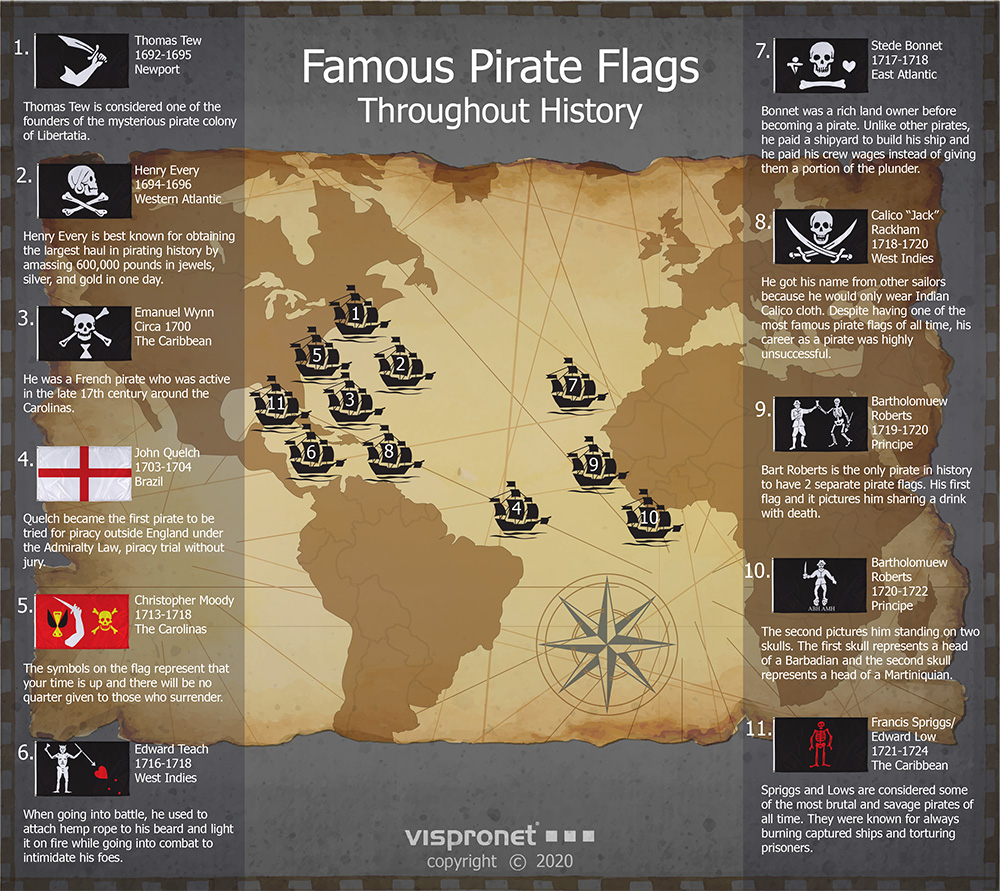
[sc name=”embed-box”]
A Short History of the Jolly Roger Pirate Flag
While pirates had been around as early as 1650, the first Jolly Rogers weren’t flown until after the Golden Age of Piracy. These first flags, flown by Bartholomew Roberts and Francis Spriggs, looked nothing like what we would expect a modern Jolly Roger to look like.
For example, Francis Spriggs’ flag was a red skeleton on a black flag. Bartholomew Roberts’ first flag was a caricature of him sharing an hourglass with Death.
No matter how they looked, all Jolly Rogers had one purpose: to send a message. They announced to anyone who saw them that the crew of the ship was pirates and that if they surrendered, they’d be given mercy.
The earliest use of a black flag with a white skull and crossbones is credited to the French pirate captain Emanuel Wynn in 1700. Wynn’s flag also used an hourglass image to symbolize that whoever saw it was running out of time. This hourglass image was then picked up by other pirates and appears on several other flags.
The skull-and-crossbones design of the Jolly Roger flag has been used in many different styles and variations. Many different pirates have used it, including “Black Sam” Bellamy, Christopher Condent and Edward England. We’ll take a look at the top ten most famous real pirate flags of all time.
10. Francis Spriggs/Edward Low
Spriggs’ flag was one of the first flags to be called a Jolly Roger. However, it lacks almost all of the symbols we’ve come to associate with Jolly Rogers. The design of Spriggs’ flag, a red skeleton on a black flag, doesn’t even originate from him. Instead, it comes from one of Spriggs’ former sailing partners, Edward Low.
Although it’s unknown when Spriggs began his career of piracy, he and Low had split by Christmas of 1724. Spriggs then took his ship, the Delight, and set sail for the Caribbean.
Francis Spriggs was still active by April of 1725, when he set some of the crew from his Caribbean conquests free on the island of Roatan off the northern coast of Honduras. He and his crew captured several more ships around Bermuda and Saint Kitts later that year. His ultimate fate after 1725 is unknown.
9. Stede Bonnet, “The Gentleman Pirate”
Bonnet’s flag is traditionally thought to have been a skull over a horizontal long bone and between a heart and a dagger (shown below). However, there is no contemporary source for this having been his flag. The earliest source listing this is from an unknown, undated manuscript that was gifted to the Maritime Museum of Britain in 1939.
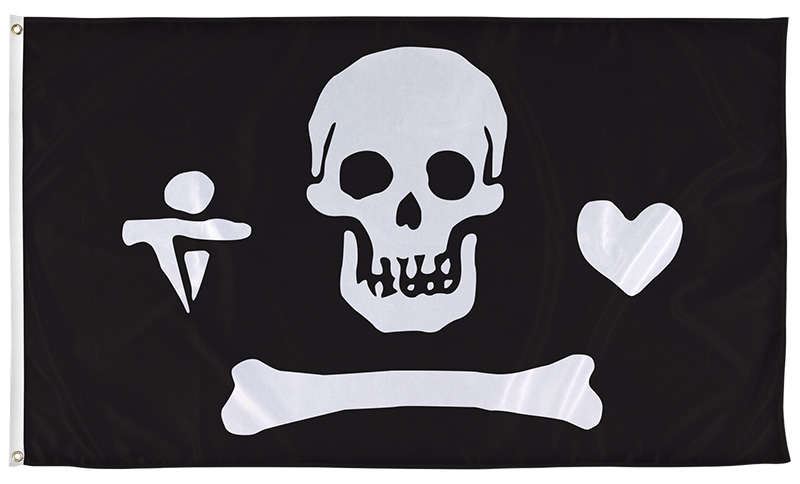
Contemporary sources say that Bonnet flew either a dark red flag or a flag with a death’s head on it. If Bonnet did indeed use the flag that popular culture had associated with him, it would have had a very clear meaning. The heart and dagger represented life and death, with the skull and bone being a crude approximation of a scale.
8. Christopher Moody
Moody is yet another pirate who completely eschews the standard conventions of the Jolly Roger that we’ve come to know. Operating from 1713 to 1718 in the waters around North and South Carolina, Moody was a particularly bloodthirsty pirate. His flag, shown below, only confirms that.
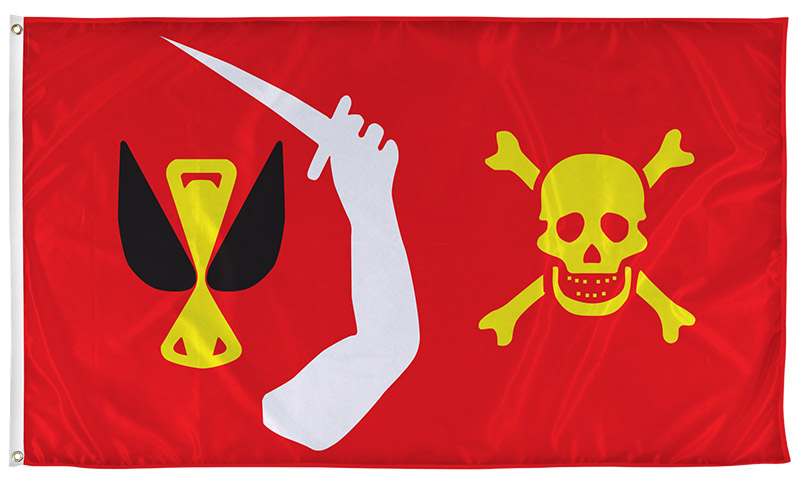
Instead of the traditional white designs on a black background that most pirates favored, Moody chose designs picked out in gold on a red background. The use of a red background is particularly ominous. Among pirates, privateers and naval captains, flying a red flag often meant that no quarter would be given.
Add this to the designs on Moody’s flag — an hourglass with wings, representing time flying away; an arm holding a dagger; and a gold skull with crossed bones — and you get a flag that is particularly chilling to see coming closer to you on the horizon.
7. Emanuel Wynn
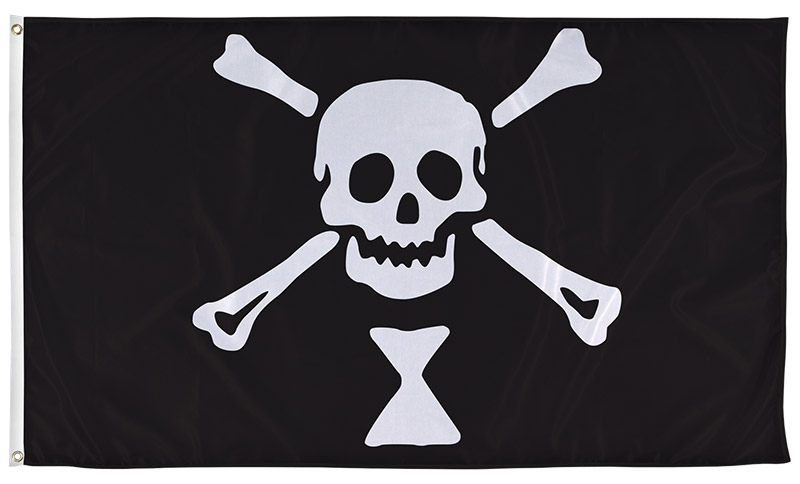
Wynne is one of the first to fly a Jolly Roger pirate flag as we know it today. His flag consisted of a white skull over crossed bones with an hourglass underneath. This was a symbol to anyone who saw it that time was running out and that they could only avoid death by surrendering.
One of the few contemporary descriptions of Wynn’s flag comes from Captain John Cranby, who commanded the HMS Poole. The Poole attacked Wynn off the Cape Verde islands in July of 1700. Cranby’s description is as follows: “a sable ensign with cross bones, a death’s head, and an hour glass.”
Following the attack by the Poole, Wynn left the Cape Verde islands for the Caribbean and more profitable raiding opportunities, attacking British and Spanish shipping. His eventual fate is unknown.
6. John Quelch
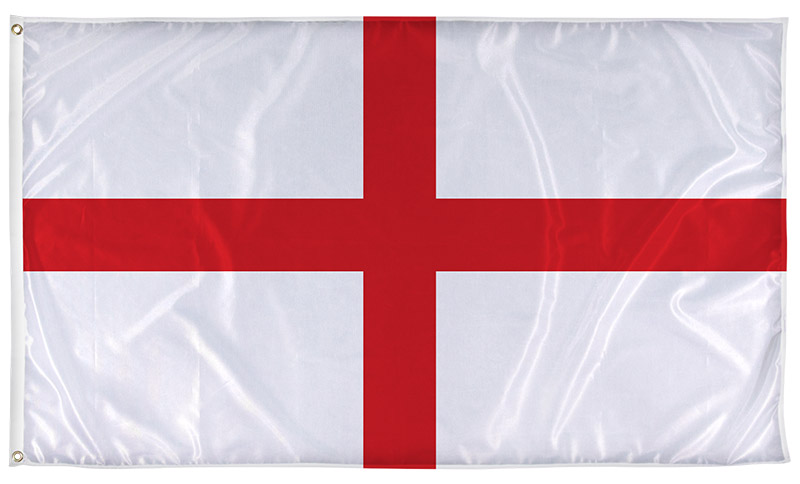
When it comes to the pirate flags on the list, John Quelch’s flag stands alone. That’s because it isn’t really a pirate flag at all: it’s the national flag of England. Before beginning his career of piracy, Quelch sailed on the English privateer ship Charles as its lieutenant. In July of 1703, the crew mutinied and elected Quelch as the new captain.
Quelch immediately sailed south for the Portuguese colony of Brazil. By the time the crew returned to their original port of call, they had over £10,000 in goods in the hold. Quelch’s prize is equivalent to about $2,416,024 today.
However, the Portuguese were not valid targets for Quelch to privateer. He was arrested and sentenced to death through an Admiralty trial — the first of its kind in America. Quelch was hanged on June 30, 1704 in Boston.
5. Thomas Tew
The flag of Thomas Tew eschews most of the standard Jolly Roger imagery except for the black flag background. In its place, his flag is an arm holding a cutlass — one of the most universal symbols of violence out there.
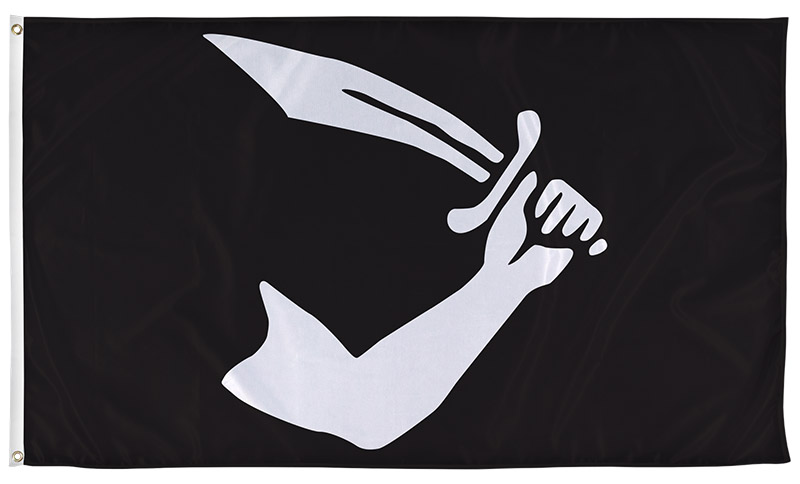
Tew’s use of a cutlass was a pretty unambiguous warning. He wouldn’t hesitate to kill anyone who stood in his way, so his enemies should just surrender. The warning was well-heeded: even though Tew was only a pirate for three years (1692 – 1695) he had managed to amass a wealth of about £8,000 ($1,651,137.49 today) by the time he died in 1695.
4. “Calico Jack” Rackham
Rackham was made famous thanks to his portrayal in the Starz TV show “Black Sails” and the video game “Assassin’s Creed IV: Black Flag”. However, he was not actually active as a pirate for very long — only two years (1718 – 1720).
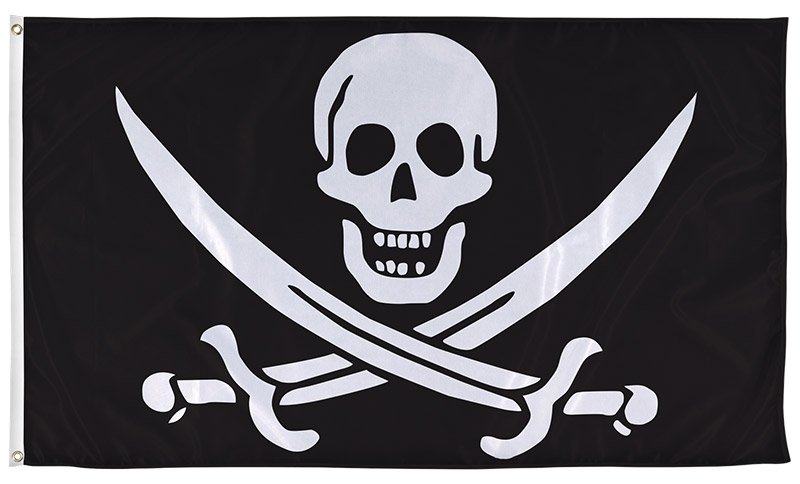
The first record of Rackham participating in piracy comes from 1718, when he was quartermaster aboard Charles Vane’s ship Ranger. After Vane was removed from captaincy of the Ranger, Rackham was voted to the captaincy. He would command several vessels throughout his time as a pirate, most notably the Kingston. No matter which ship he commanded, Rackham would use the same exact Calico Jack flag: a skull above a pair of crossed swords (shown above).
3. Henry “Long Ben” Every
One of the more famous pirates on this list, Every captured the attention of both contemporary and modern audiences. Although he was only active between 1694 and 1696, Every holds the record for the largest heist of treasure ever pulled in by one pirate crew.
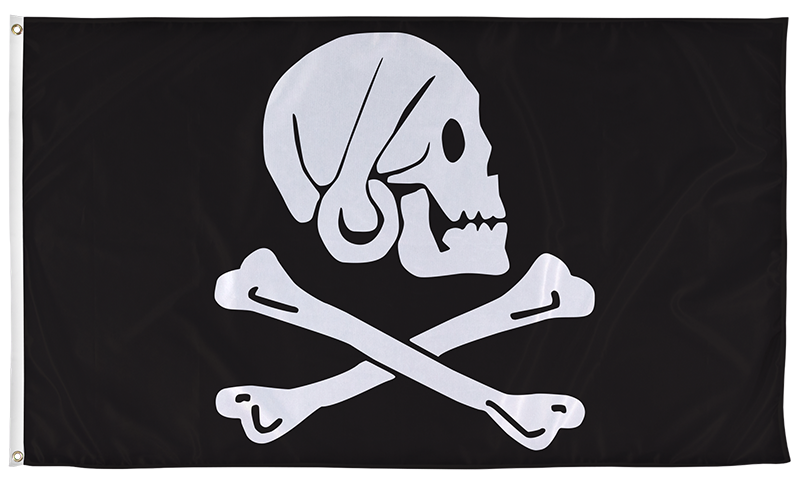
In a raid on Mughal merchant ships in 1695, Every and his crew pulled in a treasure worth 300,000 to 600,000 British pounds — the equivalent of 50 to 120 million US dollars today. Following the raid, Every largely vanished from public life. All records of his location and activities cease to exist after 1696 — including what he did with his shares of the Mughal treasure.
2. Bartholomew Roberts
Even though he was only a pirate for three years, Bartholomew Roberts is perhaps the most successful pirate on this list. From 1719 to 1722, Roberts captured over 400 prizes.
Roberts began his career of piracy June of 1719. The ship he was on was captured by pirates under Howell Davis. The pirates forced Roberts and several of his men to join them. Then they set sail for the island of Principe off the west coast of Africa.
At Principe, Captain Davis was shot dead by the Portuguese garrison, who had found out that he and his crew were pirates. With Davis dead, a new captain had to be elected — Roberts.
Although he initially had not wanted to join the pirates, Roberts accepted his promotion to captain. He reasoned that if he was going to be a pirate, it was better to be captain than a common man.
After his election to captain, Roberts drew up his first flag (shown below), which showed him together with Death, holding an hourglass.
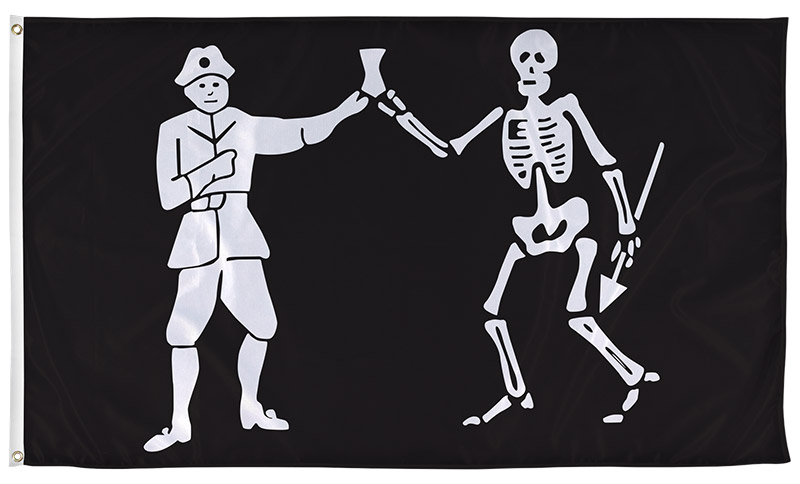
Roberts is the only pirate to have used two flags, both of them famous pirate flags in their own right. While the first came soon after his election to captaincy, the second wouldn’t come until February of 1720. Roberts found himself pursued by two pairs of sloops, one from Barbados and one from Martinique. He swore vengeance against the inhabitants of both islands and had a new flag drawn up (shown below). On it, he was standing over a pair of skulls: one labelled ABH (A Barbadian’s Head) and the other AMH (A Martiniquian’s Head).
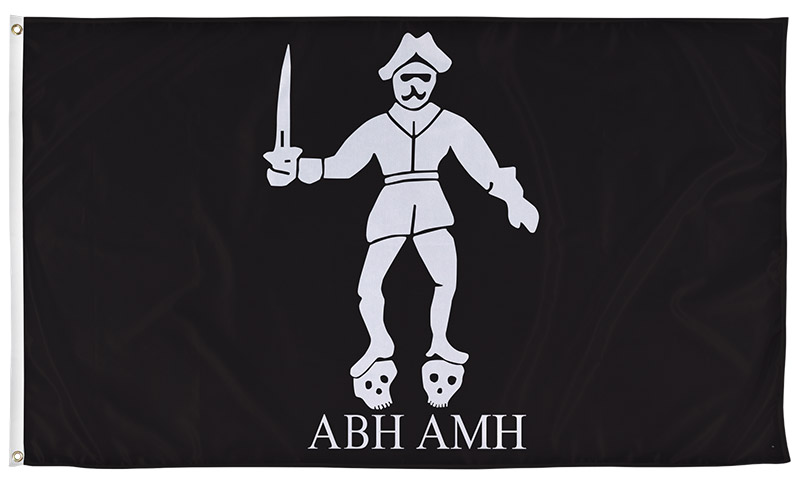
1. Edward “Blackbeard” Teach
Without a doubt the most famous pirate on this list, Edward Teach, also has the distinction of having one of the most famous pirate flags on this list.
He has become who most people think of when they hear the word “pirate”. Teach and his first ship, Queen Anne’s Revenge, have been made famous thanks to their portrayal in media such as “Sid Meier’s Pirates!” and “Assassin’s Creed IV: Black Flag”. The Blackbeard flag, shown below, is almost as famous as Blackbeard himself is.
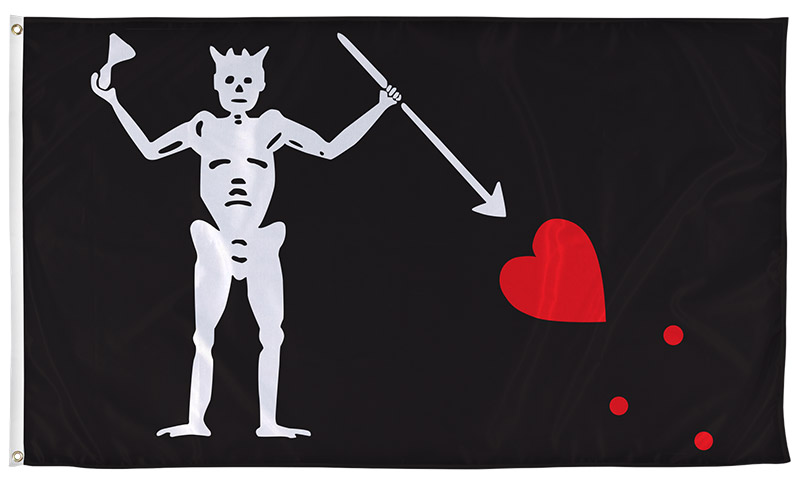
The Blackbeard Flag Meaning
Depicting a skeleton raising a toast while spearing a heart, the Blackbeard flag is almost certainly meant to intimidate one’s enemies. However, there is not as much information on the Blackbeard flag meaning.
Historians dispute that the flag publicly accepted as Blackbeard’s is actually his. The first mention of the flag that would later be accepted as Blackbeard’s is in 1912. The most widely-accepted contemporary source, “A General History of the Pyrates,” doesn’t even list Blackbeard as having a particular flag. The woodcut of his ship included with the book is simply flying a regular flag.
This hasn’t stopped the public from embracing it, however. The state of North Carolina flew Blackbeard’s flags from its ferries in 2018 to celebrate the 300th anniversary of the battle of Ocracroke Island and Blackbeard’s death.
If you’re looking to get your own Jolly Roger, or to design a custom flag, head over to the Vispronet.com webstore and pick one up today!
Sources
-
- Infamous Pirates — Francis Spriggs: https://goldenageofpiracy.org/pirates/francis-spriggs.php
- At The Point Of A Cutlass: https://books.google.com/books?id=VWG0AwAAQBAJ&printsec=frontcover#v=onepage&q&f=false
- Francis Spriggs: https://www.thepirateking.com/bios/spriggs_francis.htm
- Pirates — Christopher Moody: https://www.crwflags.com/fotw/flags/pir-mody.html
- The Biography of John “Calico Jack” Rackham: https://www.thoughtco.com/biography-of-john-calico-jack-rackham-2136377
- The Trials of Joseph Dawson, et al: https://catalog.loc.gov/vwebv/search?searchCode=LCCN&searchArg=19011844&searchType=1&permalink=y
- Henry Every’s Bloody Pirate Raid: https://www.history.com/articles/henry-everys-bloody-pirate-raid-320-years-ago
- A General History of the Pyrates: From Their First Rise and Settlement In The Land Of Providence To The Present Time: https://books.google.com/books?id=oipEAQAAMAAJ&pg=PA230#v=onepage&q=AMH&f=false



